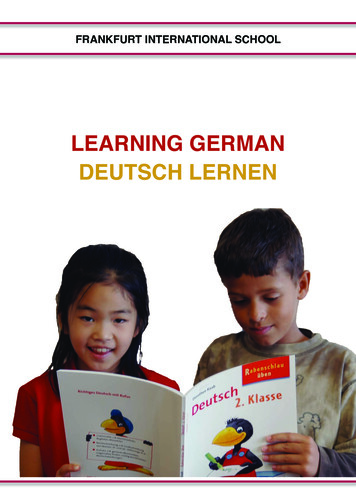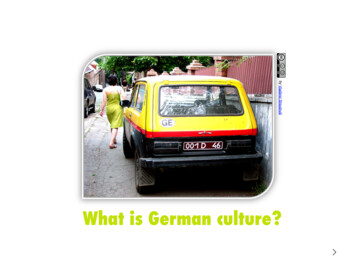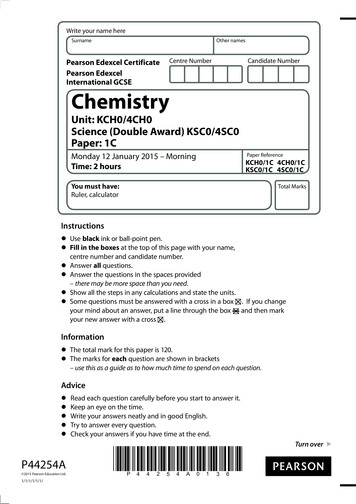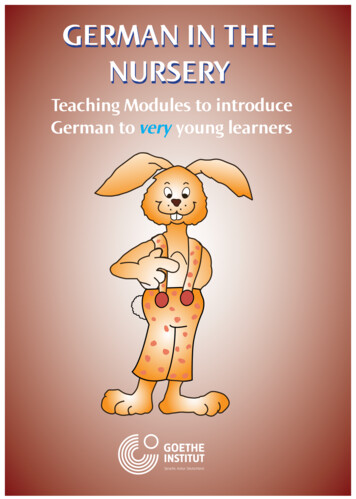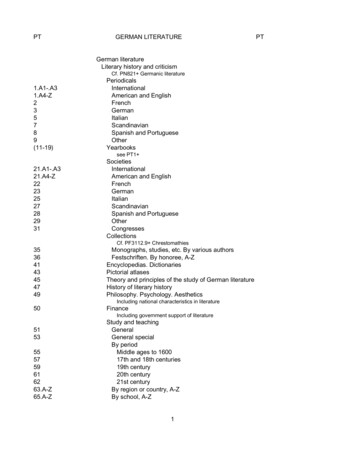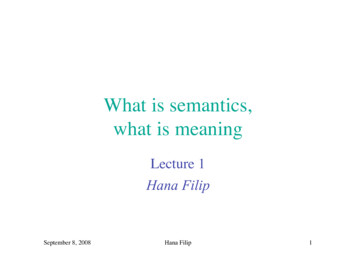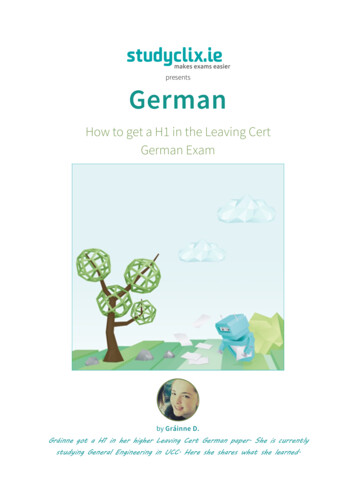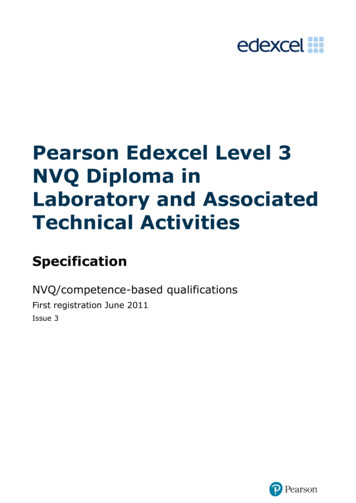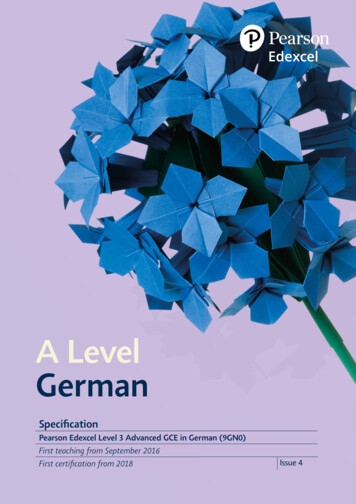
Transcription
A LevelGermanSpecificationPearson Edexcel Level 3 Advanced GCE in German (9GN0)First teaching from September 2016First certification from 2018Issue 4
Summary of Pearson Edexcel Level 3 Advanced GCEin German specification changesIssue 4 ChangesSummary of changes made between previous issue and this current issuePagenumberAssessment information for Paper 1 amended with updated guidance on how toaccess the recordings for Section A (listening)11‘recordings will be issued as audio files via our Secure Download Service (SDS) priorto the exam’Administration and general information about the conduct of the speaking assessmentamended with updated guidance on now to submit recordings of the speakingassessment‘Complete, unedited recordings of all assessments must be submitted to Pearson viathe online Learner Work Transfer (LWT) portal’If you need further information on these changes or what they mean, contact us via ourwebsite at: tml.37
Contents1Introduction2Why choose the Edexcel Level 3 Advanced GCE in German?2Supporting you in planning and implementing this qualification3Qualification at a glance427Subject content and assessment informationThemes and sub-themes8Paper 1: Listening, reading and translation10Paper 2: Written response to works and translation12Paper 3: Speaking19Assessment Objectives39340Administration and general informationEntries40Access arrangements, reasonable adjustments, special consideration andmalpractice40Student recruitment and progression43Appendix 1: Independent research project form (RP3)47Appendix 2: Prescribed literary texts and films49Appendix 3: Grammar list50Appendix 4: The context for the development of thisqualification53Appendix 5: Transferable skills55Appendix 6: Level 3 Extended Project qualification56Appendix 7: Codes58
1 IntroductionWhy choose the Edexcel Level 3 Advanced GCE inGerman?We believe languages should appeal to all students. Our new Pearson Edexcel A Level inGerman has been developed to inspire all students who have an appreciation of thelanguage, literature, film and culture of the German-speaking world.We’ve listened to feedback from the languages community – subject associations, academicsand advisors, together with hundreds of teachers and students – and have designed amotivating course of study that will enable your students to develop an advanced levelknowledge and understanding of the German language, the culture of Germany and otherGerman-speaking countries, as well as practical and valuable language and transferablestudy skills. This specification will help to prepare students for higher education and enhancetheir employability profile.Inspiring and engaging themes – our qualification features familiar and popular themesas well as some new content that provides clear links to some of the most fundamental andinteresting aspects of the culture of the target language country and communities.Popular literary texts and films – we offer a rich choice of literary texts and films thatincludes contemporary and more classical titles, together with authentic source materialsfrom Germany and the wider German-speaking world.Rewards creativity – our assessments place an emphasis on spontaneity and grammar, aswell as providing plenty of opportunities for students to apply their knowledge independentlyand creatively. Clear mark schemes encourage students to develop ideas, use language topersuade and analyse, and give critical responses in their writing and speaking.Clear and coherent structure – our qualification has a straightforward structure with fourengaging themes – Gesellschaftliche Entwicklung in Deutschland; Politische und künstlerischeKultur im deutschen Sprachraum; Immigration und die deutsche multikulturelle Gesellschaftand Die Wiedervereinigung Deutschlands. The four themes are studied alongside two works(either two literary texts or one literary text and one film) assessed through two externallyexamined papers (Paper 1 and Paper 2) and one teacher-examiner conducted speakingassessment (Paper 3).Manageable content – we have worked closely with teachers and students to ensure thatour content is manageable and appropriate, so that you and your students can be confidentthat you have enough time to cover what you need to at the appropriate depth.Continuous progression – our content builds on the understanding developed atKey Stage 4 and AS Level and gives students the opportunity to learn and apply importanttransferable skills in critical thinking and analysis, enabling them to make a smoothtransition to the next level of study.AS and A Level qualifications that are co-teachable – co-teaching AS and A Levelprovides flexibility for you and your students. Centres co-teaching AS and A Level can deliverTheme 1 and Theme 2 and one literary text or film in the first year, allowing students to beentered for the AS at the end of the year.2Pearson Edexcel Level 3 Advanced GCE in German – Specification –Issue 4 – January 2022 Pearson Education Limited 2022
Supporting you in planning and implementingthis qualificationPlanning Our Getting Started Guide, available on our website, gives you an overview of the newA Level qualification to help you get to grips with the changes to content and assessmentand to help you understand what these changes mean for you and your students. We will give you an editable course planner and scheme of work that you can adapt tosuit your department. Our mapping documents highlight key differences between the new and 2008qualification.Teaching and learningThere will be lots of free teaching and learning support to help you deliver the newqualifications, including: support with the new literary text and film elements suggested resource lists to help with the teaching of society and culture support for the independent research project support for spontaneous speaking.Preparing for examsWe will also provide a range of resources to help you prepare your students for theassessments, including: specimen papers to support formative assessments and mock exams marked exemplars of student work with examiner commentariesResultsPlusResultsPlus provides the most detailed analysis available of your students’ examperformance. It can help you identify the topics and skills where further learning wouldbenefit your students.Get help and supportOur subject advisor service, led by Alistair Drewery, and online community will ensure thatyou receive help and guidance from us, and that you can share ideas and information withother teachers. You can sign up to receive e-newsletters to keep up to date with qualificationupdates and product and service news.Learn more at qualifications.pearson.comPearson Edexcel Level 3 Advanced GCE in German – Specification –Issue 4 – January 2022 Pearson Education Limited 20223
Qualification at a glanceContent and assessment overviewThe Pearson Edexcel Level 3 Advanced GCE in German consists of two externally-examinedpapers assessing listening, reading and writing and a speaking assessment. The speakingassessment is externally set and conducted by a teacher-examiner*. All assessments aremarked by Pearson.Students must complete their speaking assessment in April/May and all other assessments inMay/June in any single year.*It is usual for teachers to conduct the speaking assessment with their students during atimetabled assessment window in April/May, although Pearson offers a visiting examinerfacility. Timetable and fee information will be available on the Pearson qualifications websitewww.qualifications.pearson.comPaper 1: Listening, reading and translation (**Paper code: 9GN0/01)Written examination: 2 hours40% of the qualification80 marksContent overviewThis paper draws on vocabulary and structures across all four themes. Themes are basedon the society and culture of the language being studied and are listed on pages 8–9.Assessment overviewStudents are not permitted access to a dictionary during the examination.The examination is made up of:Section A: Listening (30 marks)A listening assessment based on a recording, featuring male and female Germanspeakers. Students will respond to comprehension questions based on a variety ofcontexts and sources.The listening audio files for the sample assessment materials are available on our website.Section B: Reading (30 marks)A reading assessment based on a variety of text types and genres where students willhave to respond to comprehension questions.Section C: Translation into English (20 marks)An unseen passage to be translated from German to English.4Pearson Edexcel Level 3 Advanced GCE in German – Specification –Issue 4 – January 2022 Pearson Education Limited 2022
Paper 2: Written response to works and translation (**Paper code: 9GN0/02)Written examination: 2 hours and 40 minutes30% of the qualification120 marksContent overviewThis paper draws on the study of two discrete German works: either two literary texts, orone literary text and one film. The works must be taken from the list provided inAppendix 2: Prescribed literary texts and films. The literary texts listed include a series ofshort stories and a range of plays, novellas and novels. All of the films are feature length.Assessment overviewThis paper includes a translation exercise and two essays on either two literary texts, orone literary text and one film (students must not answer questions on two films).Students are not permitted access to a dictionary or any documentation relating to theworks during the examination.Section A: Translation (20 marks)Students translate an unseen passage from English into German.Section B: Written response to works (literary texts) (50 marks)Students must write an extended response on either one or two of the literary texts listedin Appendix 2: Prescribed literary texts and films.Students select one question from a choice of two for each of their chosen literary text(s).If a student answers questions on two literary texts then they do not complete Section C.Section C: Written response to works (films) (50 marks)Students who answer only one question from a literary text in Section B must now write anextended response on one of the films listed in Appendix 2: Prescribed literary texts andfilms.Students select one question from a choice of two for their chosen film.Pearson Edexcel Level 3 Advanced GCE in German – Specification –Issue 4 – January 2022 Pearson Education Limited 20225
Paper 3: Speaking (**Paper code: 9GN0/03)Internally conducted and externally assessedTotal assessment time: between 21 and 23 minutes, which includes a single periodof 5 minutes’ formal preparation time30% of the qualification72 marksContent overviewTask 1 draws on vocabulary and structures across all four themes (listed on pages 8–9).Task 2 is based on independent research selected and carried out by the student. Theresearch may be based on one of the themes or on the student’s own subject of interestrelated to the society and culture of the language studied.Students will be assessed on their ability to use a range of language accurately,communicate and interact effectively, summarise and analyse findings from written sourcesrelating to their research subject, and show knowledge and understanding about the cultureand society where the language is spoken.Assessment overviewStudents complete two tasks. Task 1 is worth 30 marks and Task 2 is worth 42 marks.Task 1 (discussion on a Theme)Students discuss one theme from the specification based on a stimulus containing twodifferent statements.Task 2, Part 1 (independent research presentation)Students present a summary of at least two of the written sources they have used for theirresearch and give a personal response to what they have read.Task 2, Part 2 (discussion on independent research)Students answer questions on their presentation and then have a wider discussion on theirresearch.**See Appendix 7: Codes for a description of this code and all other codes relevant to thisqualification.6Pearson Edexcel Level 3 Advanced GCE in German – Specification –Issue 4 – January 2022 Pearson Education Limited 2022
2 Subject content and assessmentinformationQualification aims and objectivesThe aims and objectives of this qualification are to enable students to: enhance their linguistic skills and promote and develop their capacity for critical thinkingon the basis of their knowledge and understanding of the language, culture and society ofthe country or countries where the language is spoken develop control of the language system to convey meaning, using spoken and writtenskills, including an extended range of vocabulary, for both practical and intellectualpurposes as increasingly confident, accurate and independent users of the language develop their ability to interact effectively with users of the language in speech and inwriting, including through online media develop language learning skills and strategies, including communication strategies tosustain communication and build fluency and confidence engage critically with intellectually stimulating texts, films and other materials in theoriginal language, developing an appreciation of sophisticated and creative uses of thelanguage and understanding them within their cultural and social context develop knowledge about matters central to the society and culture, past and present, ofthe country or countries where the language is spoken mediate between cultures and between speakers of the language and speakers of English foster their ability to learn other languages equip themselves with transferable skills such as autonomy, resourcefulness, creativity,critical thinking, and linguistic, cultural and cognitive flexibility that will enable them toproceed to further study or employment develop their capacity for critical and analytical thinking through the language of study develop as independent researchers through the language of study.Pearson Edexcel Level 3 Advanced GCE in German – Specification –Issue 4 – January 2022 Pearson Education Limited 20227
Themes and sub-themesPapers 1 and 3 will be based on content from the following four themes.The four themes address a range of social issues and trends, as well as aspects of thepolitical and artistic culture of Germany and German-speaking countries.Themes 1, 3, and 4 focus on aspects of society or history of Germany only. Theme 2 requiresstudents to broaden their knowledge across any German-speaking country/countries and/orcommunity/communities. Each theme is broken into three sub-themes (highlighted in bold).These sub-themes are each exemplified further.Theme 1: Gesellschaftliche Entwicklung in DeutschlandTheme 1 is set in the context of Germany only. This theme covers social issues and trends. Natur und UmweltUmweltbewusstsein; Recycling; erneuerbare Energie; nachhaltig leben. BildungBildungswesen und die Situation von Studenten; Sitzenbleiben, Berufsausbildung. Die Welt der ArbeitDas Arbeitsleben in Deutschland und die Arbeitsmoral; deutsche Geschäfte und Industrien.Theme 2: Politische und künstlerische Kultur im deutschenSprachraumTheme 2 is set in the context of German-speaking countries and communities This themecovers artistic culture (through music and festivals and traditions) and political and artisticculture (through media). MusikWandel und Trends; Einfluss der Musik auf die populäre Kultur. Die MedienFernsehen, Digital-, Print- und Onlinemedien; Einfluss auf Gesellschaft und Politik. Die Rolle von Festen und TraditionenFeste, Feiern, Sitten, Traditionen.Theme 3: Immigration und die deutsche multikulturelle GesellschaftTheme 3 is set in the context of Germany only. This theme covers social issues and trends. Die positive Auswirkung von ImmigrationBeitrag der Immigranten zur Wirtschaft und Kultur. Die Herausforderungen von Immigration und IntegrationMaßnahmen von Gemeinden und örtlichen Gemeinschaften; Ausgrenzung und Entfremdungaus der Sicht von Immigranten. Die staatliche und soziale Reaktion zur ImmigrationRechtsextremismus; politische Annäherung an Gastarbeiter, Immigranten und Asylbewerber;die öffentliche Meinung.8Pearson Edexcel Level 3 Advanced GCE in German – Specification –Issue 4 – January 2022 Pearson Education Limited 2022
Theme 4: Die Wiedervereinigung DeutschlandsTheme 4 is set in the context of Germany only. This theme covers political culture. Die Gesellschaft in der DDR vor der WiedervereinigungArbeit; Wohnungswesen; kommunistische Prinzipien; das Verhältnis zum Westen. Ereignisse vor der WiedervereinigungDer Zusammenbruch des Kommunismus; der Fall der Berliner Mauer. Deutschland seit der WiedervereinigungMigration von Ost nach West; Arbeitslosigkeit in der früheren DDR; Auswirkungen aufSchulen in Deutschland.Pearson Edexcel Level 3 Advanced GCE in German – Specification –Issue 4 – January 2022 Pearson Education Limited 20229
Paper 1: Listening, reading and translationContentStudents will be assessed on their understanding of spoken and written German from avariety of types of authentic texts and listening material, as well as their ability to translateaccurately from German into English.Texts and recordings vary in length to include some extended passages. All spoken andwritten materials are culturally relevant to Germany and German-speaking countries and aredrawn from the four themes (listed on pages 8–9).Students should be able to: understand main points, gist and detail from spoken and written material infer meaning from complex spoken and written material assimilate and use information from spoken and written sources, including material fromonline media summarise information from spoken sources, reporting key points and subject matter translate from German into English.ListeningThe listening section will be made up of spoken passages covering different registers andtypes, including authentic communication involving one or more male and female speakers.Sources will include material from online media.ReadingThe reading section will be made up of texts containing both factual and abstract content andwill be authentic or adapted from authentic sources. The texts will include contemporary,historical, literary, fiction and non-fiction, written for different purposes and audiences.Translation into EnglishThe content of the translation will be taken from one of the four themes.Assessment information First assessment: May/June 2018. The total assessment time is 2 hours. Recommended timings for each section are givenbelow. The assessment is out of 80 marks. There are three sections in the paper, they cover the assessment of listening, reading andtranslation skills in German. Students must answer all questions in each section (A, B and C). The use of dictionaries is not permitted. For Section A (listening), 50 minutes (recommended timing), 30 marks:o there are four questions in this section made up of multiple choice and open response,including questions testing summary skills; all questions are set in German and must beanswered in Germano students will listen to a recording featuring German-language speakers who will speakat a speed appropriate for the expected understanding at this level10Pearson Edexcel Level 3 Advanced GCE in German – Specification –Issue 4 – January 2022 Pearson Education Limited 2022
o recordings will be issued as audio files via our Secure Download Service (SDS) prior tothe examo students will have individual control of the recording and may stop, revisit and replaysections of the recording as they wish. For Section B (reading), 50 minutes (recommended), 30 marks:o students respond to five questions based on the texts providedo questions comprise both multiple-choice questions and open-response questions; allquestions are set in German and must be answered in German. For Section C (translation into English), 20 minutes (recommended), 20 marks:o students are given one unseen text in German and must translate it into English.The recommended timings have been set to enable the student to complete each section insufficient time.Sample assessment materialsA sample paper and mark scheme for this paper can be found in the Pearson Edexcel Level 3Advanced GCE in German Sample Assessment Materials (SAMs) document.The listening audio files are available on our website.Pearson Edexcel Level 3 Advanced GCE in German – Specification –Issue 4 – January 2022 Pearson Education Limited 202211
Paper 2: Written response to works and translationContentStudents should be able to: develop a detailed understanding and appreciation of the works studied, by writing criticaland analytical responses in the language of study to the works, taken from the prescribedlist provided (see Appendix 2: Prescribed literary texts and films) produce responses that show critical appreciation of features such as:o key concepts and issues;o characterisation;o form and technique of presentation, e.g. effect of narrative voice in prose text, effect ofcamera work in film;o social and cultural setting;as appropriate to the work studied present viewpoints, develop arguments, draw conclusions, analyse and evaluate in writing manipulate language accurately through translating an unseen passage from English intoGerman.Students must study two discrete German works: either two literary texts, or one literarytext and one film. The works must be taken from the list in Appendix 2: Prescribed literarytexts and films. The literary texts listed include a range of novels, plays and a series of shortstories. All of the films are feature length. The content of the translation will be a passagebased on one of the four themes.Assessment information First assessment: May/June 2018. The total assessment time is 2 hours and 40 minutes. Recommended timings for eachsection are given below. The assessment is out of 120 marks. There are two parts to this paper, Section A (translation into German) and Sections B andC (written response to works). For Section A (translation into German), 30 minutes (recommended timing), 20 markso students are given one unseen text in English and must translate it into German. For Sections B and C (written response to works), 2 hours and 10 minutes, 100 markso students must write two essays, either two selected from Section B (literary texts) orone selected from Section B (literary texts) and one from Section C (films)o there will be a choice of two questions for each literary text and film. It is recommendedthat, in order to give a detailed analysis of the work, students write between300–350 words for each essay, giving justified points of view, arguments andconclusions with evidence from the work. The whole essay will be marked regardless oflength.o students are expected to provide a critical and analytical response by selecting relevantmaterial form the works, presenting and justifying points of view, developingarguments, drawing conclusions based on understanding, and evaluating issues,themes and cultural and social contexts related to the works studied.12Pearson Edexcel Level 3 Advanced GCE in German – Specification –Issue 4 – January 2022 Pearson Education Limited 2022
o no credit will be given for essays on literary texts which are based on film versionsadapted from the literary texts. Evidence given in the essay to justify viewpoints andarguments must be based on the original literary text. All questions will be set in German and must be answered in German. The use of dictionaries is not permitted. Students must not take any documentation relating to the works into the examination.The recommended timings have been given to enable the student to complete each sectionin sufficient time.Sample assessment materialsA sample paper and marking criteria (including guidance on how these criteria are applied)for this paper can be found in the Pearson Edexcel Level 3 Advanced GCE in German SampleAssessment Materials (SAMs) document.Marking guidanceMarking guidance has been written to accompany the SAMs and is included with the SAMsbooklet. Please note that this guidance is for the use of the Pearson-appointed externalexaminer. They are printed for reference in the specification to aid understanding of how theassessment criteria will be applied.Pearson Edexcel Level 3 Advanced GCE in German – Specification –Issue 4 – January 2022 Pearson Education Limited 202213
Marking guidance for Paper 2: Written response to works andtranslationThis marking guidance is for the use of Pearson-appointed external examiners. The guidancehas been included for teacher reference to aid understanding of how the assessment criteriawill be applied.Section A – Question 1 (translation) into assessed languageThis task is marked using a points-based mark scheme in which 1 mark is given for eachcorrect individual section of language. Please see the Pearson Edexcel Level 3 Advanced GCEin German Sample Assessment Materials (SAMs) document for an example of how thetranslation will be marked.Sections B and C – Questions 2 to 26 (written response to works)There are three levels-based mark grids to be applied to each individual essay that makes upthe written response to works. The mark grids are: Critical and analytical response (AO4) Range of grammatical structures and vocabulary (AO3) Accuracy of language (AO3).General guidance on using levels-based mark schemesStep 1: Decide on a band The examiner will first of all consider the answer as a whole and then decide whichdescriptors most closely match the answer and place it in that band. The descriptors foreach band indicate the different features that will be seen in the student’s answer for thatband. When assigning a level, the examiner will look at the overall quality of the answer and notfocus disproportionately on small and specific parts of the answer where the student hasnot performed quite as well as the rest. If the answer covers different aspects of differentbands of the mark scheme, the examiner will use a ‘best fit’ approach for defining thelevel and then use the variability of the response to help decide the mark within the level,for example if the response is predominantly band 5–8 with a small amount of band 9–12material, it would be placed in band 5–8 but be awarded a mark near the top of the bandbecause of the band 9–12 content.Step 2: Decide on a mark Once the examiner has decided on a band they will need to decide on a mark within theband. They will decide on the mark to award based on the quality of the answer; they will awarda mark towards the top or bottom of that band depending on how the student hasevidenced each of the descriptor bullet points. The examiner will modify the mark based on how securely the trait descriptors are met atthat band. They will need to go back through the answer as they apply the mark scheme to clarifypoints and assure themselves that the band and the mark are appropriate.14Pearson Edexcel Level 3 Advanced GCE in German – Specification –Issue 4 – January 2022 Pearson Education Limited 2022
Critical and analytical response (AO4) This mark grid assesses students’ ability to respond critically and analytically to the aspectof the literary work or film outlined in the question. To provide a critical and analyticalresponse, students should select relevant material, present and justify points of view,develop arguments, draw conclusions based on understanding and evaluate issues,themes and cultural and social contexts. This grid will be applied twice, once for each essay individually. When deciding how to reward an answer, examiners will consult this mark grid as well asthe indicative content associated with each question which can be found in the documentPearson Edexcel Level 3 Advanced GCE in German Sample Assessment Materials (SAMs).Indicative content contains points that students are likely to use to construct their answer.It is possible for an answer to be constructed without mentioning some or all of thesepoints as long as students provide alternative responses that fulfil the requirements of thequestion.MarksDescription0No rewardable material.1–4 Points of view relating to issues/themes/cultural or social contexts are presented,with simplistic justification; limited interpretation with frequent misunderstandingor confusion; any evidence from the work is descriptive. Limited ability to form arguments or draw conclusions. Response relates to the work but limited focus on the question.5–8 Points of view relating to issues/themes/cultural or social contexts are presented,with attempts made at interpretation, but they occasionally showmisunderstanding or confusion; evidence selected from the work for justificationis occasionally appropriate but often descriptive. Arguments are made but with inconsistencies; conclusions are drawn but do notfully link to arguments. Response relates to the work but often loses focus on the question.9–12 Critical analysis of issues/themes/cultural or social contexts is evident in relationto particular aspects of the question, with some appropriate interpretations andpoints of view, sometimes justified by appropriately selected evidence from thework. Logical arguments are followed through on particular aspects of the question,occasionally detailed and with linked conclusions; some points are made withoutexploration. Response is relevant to particular aspects of the question, occasional lossof focus.13–16 Critical analysis of issues/themes/cultural or social contexts is frequentlydemonstrated, with some convincing interpretations and points of view,predominantly justified with appropriately selected evidence from the work. Generally detailed, logical arguments are made, with some persuasiveconclusions that mostly link together. Predominantly relevant response to the question.17–20 Critical analysis of issues/themes/cultural or social contexts is demonstratedthrough convincing interpretations
German-speaking countries, as well as practical and valuable language and transferable . Section C: Translation into English (20 marks) . short stories and a range of plays, n

